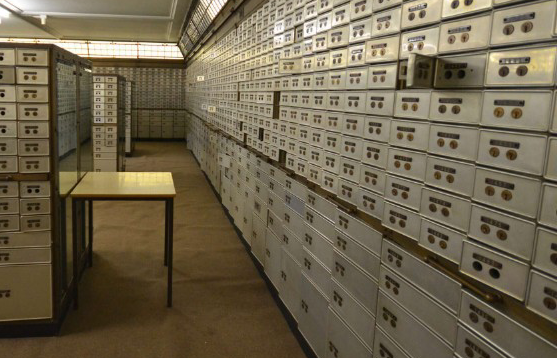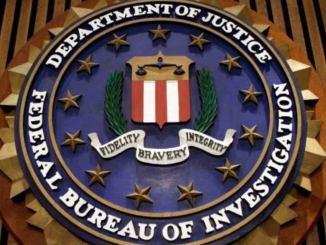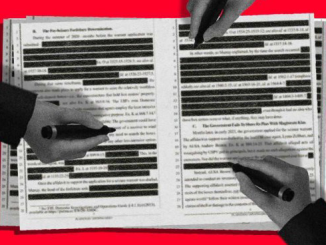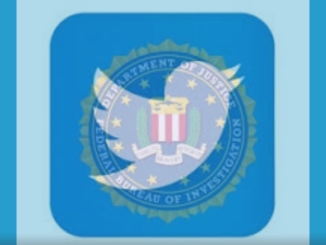
The FBI told a federal magistrate judge that it intended to open hundreds of safe deposit boxes seized during a March 2021 raid in order to inventory the items inside—but new evidence shows that federal agents were plotting all along to use the operation as an opportunity to forfeit cash and other valuables.
Federal agents failed to disclose those plans to the federal magistrate judge who issued the warrant for the high-profile raid of U.S. Private Vaults, a private business in Beverly Hills, California, that had been the subject of an FBI investigation since at least 2019. When the raid took place, the FBI also seems to have ignored limitations imposed by the warrant, including an explicit prohibition against using the safe deposit boxes as the basis for further criminal investigations.
Those details regarding the planning and execution of the FBI’s raid of U.S. Private Vaults are now out in the open after a different federal judge ruled this week that the government could not keep those details out of the public record. As Reason has extensively reported, the raid on U.S. Private Vaults resulted in federal agents seizing and attempting to forfeit more than $86 million in cash as well as gold, jewelry, and other valuables from property owners who were suspected of no crimes. Attorneys representing some plaintiffs who are trying to recover their possessions interviewed the FBI agents who planned the raid, but federal prosecutors tried to keep some details of those depositions redacted.
The unredacted legal documents, filed in federal court on Thursday, show why the government was eager to keep those details under wraps. (Reason submitted an amicus brief in the case arguing that the redacted documents should be made public.)
In the affidavit submitted as part of the effort to obtain a warrant for the search, Assistant U.S. Attorney Andrew Brown wrote that federal agents intended to merely inventory the contents of the seized safe deposit boxes. But the newly unredacted documents show that the FBI had drawn up plans months earlier to forfeit property from the boxes, and failed to inform the magistrate judge about those plans.
“We had already determined that there was probable cause to move forward” with civil forfeiture proceedings against the contents of the safe deposit boxes before the search occurred, FBI Special Agent Jessie Murray said in a deposition, according to court documents.
Those crucial details were omitted from the affidavit submitted to the magistrate judge who granted the warrant that allowed the FBI to search U.S. Private Vaults. As Reason has previously detailed, that same warrant expressly forbade federal agents from engaging in a “criminal search or seizure of the contents of the safety [sic] deposit boxes.”
The newly unredacted documents suggest the FBI never intended to abide by that limitation. In a deposition, Special Agent Lynne Zellhart said she drew up “supplemental instructions” for the agents who would be conducting the raid of U.S. Private Vaults. They were instructed to be on the lookout for cash stored inside the safe deposit boxes and to note “anything which suggests the cash may be criminal proceeds.” Agents arranged to have drug-sniffing dogs present for the supposed inventory of the contents of the safe deposit boxes—which doesn’t do anything to help inventory items, of course, but makes more sense if the actual goal is to initiate forfeiture proceedings.
“The government misled the court about its forfeiture plans when applying for the seizure warrant, intentionally disregarded the warrant’s substantive limitations, and conducted a pretextual sham ‘inventory’ while searching for evidence of criminality,” wrote Robert Frommer and Robert Johnson, attorneys with the Institute for Justice, which is representing some of the victims of the U.S. Private Vaults raid.
In court documents, the attorneys say the government’s behavior “before, during, and after” the raid at U.S. Private Vaults is a violation of the Fourth Amendment, which protects Americans from unreasonable searches and seizures.
As Reason has previously reported, the inventories themselves were sloppily done, leaving the impression that agents were using the procedure as justification for a fishing expedition. The newly unsealed depositions seem to corroborate that view, as Zellhart’s supplemental instructions told agents to note cash that had “strong odors” or was packaged in such a way that might indicate it was connected to drug purchases.
The FBI had been investigating U.S. Private Vaults for more than five years and had previously targeted individuals suspected of using the business to stash the proceeds of criminal activity. In 2019, according to some of the newly unredacted depositions, federal agents shifted their approach and began building a case against the company as a whole.
But the raid that targeted the businesses also swept up the private property of hundreds of people suspected of no crime. In the same way that criminality by a landlord would not allow the police to search every apartment in a building the landlord owns, attorneys for the victims of the raid argue that there was no reason for the FBI to open and rifle through hundreds of safe deposit boxes belonging to people who were suspected of no crimes.
“The ‘inventory’ was a sham,” argue Frommer and Johnson in court documents. “Indeed, the whole idea of inventorying the vault was unreasonable on its face, as the best way to serve the purposes of an inventory would have been to leave the property safely locked away and appoint a receiver to wind down USPV’s business without an invasion of privacy.”
Unless, of course, that invasion of privacy was the whole point of the raid. The newly unredacted documents seem to suggest it was.
* Article from: reason.com


